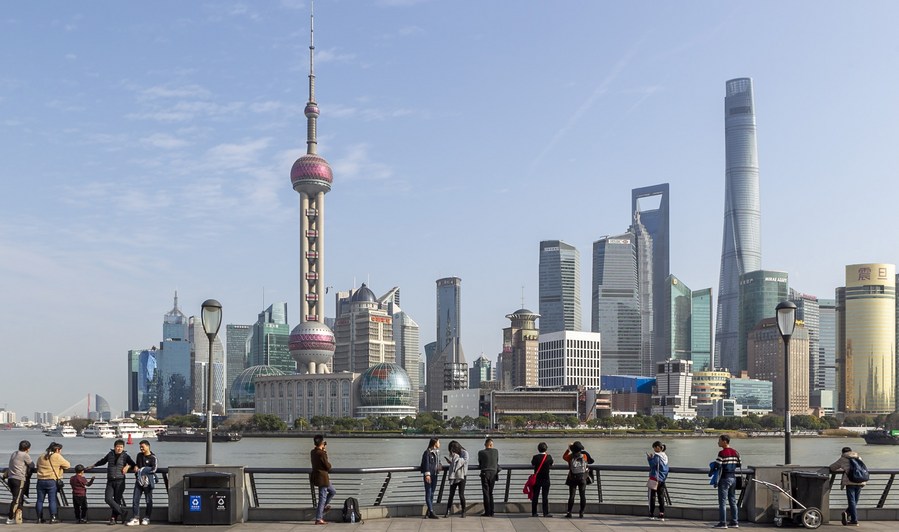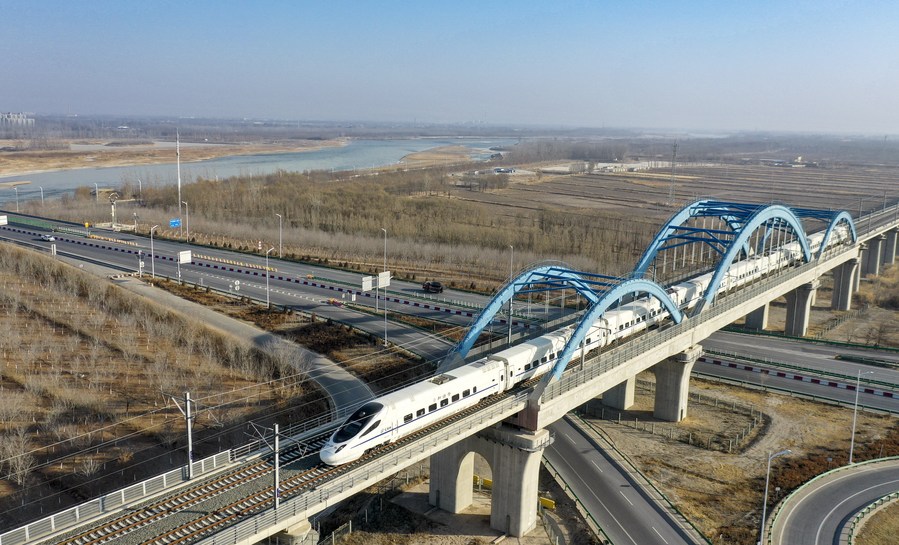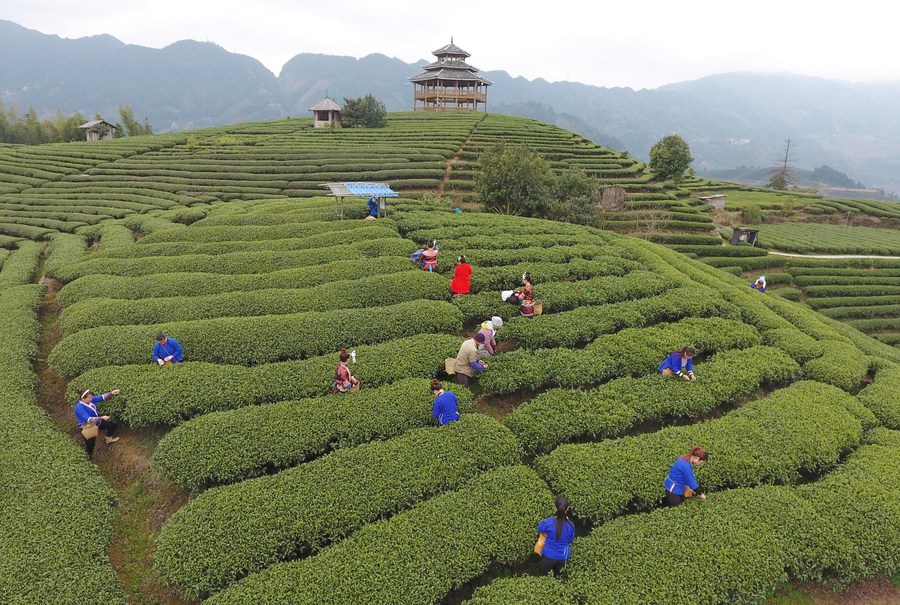'天气预报'('怎么在电脑上打出')
by Anna Malindog-Uy
After its opening up in the 1970s, China's rapid growth into the second largest economy in the world, with growing global economic and political influence today, makes China not only one of the most influential countries in today's international politics and economics but an inspiration to the developing world.

Tourists visit the Bund in Shanghai, east China, Jan. 6, 2020. (Photo by Wang Xiang/Xinhua)
In a world dominated by the Western economic paradigm of capitalism, and political ideology of liberal democracy, which in many ways have been imposed on the Global South, and are prized as the path toward modernization and economic development for many countries across continents, China is marching towards modernization and economic development on a different path, deviating from the Western-centric prototype and concept of development. China has been pursuing a development and modernization trajectory based on its own historical grounding and experience, unique internal conditions and realities, as well as cultural and civilizational foundations.
In many ways, China's rapid economic growth and prosperity is not only an inspiration for countries in the developing world, but offers an alternative economic and political model for the Global South versus the Western-centric model of development that is exemplified by the "dependence trap," where the Global South is the development aid recipients, while the North, composed of a few affluent countries (former colonial masters), is the provider of development aid with prescribed structural conditionalities and packages intended to underwrite structural reforms, continuing inequalities and inequities, fortified by asymmetries in wealth, power, and resources, which fundamentally reflect the unequal divide between the North and South.

This aerial photo taken on Dec. 29, 2022 shows a train passing by the Yellow River in Zhongwei City, northwest China's Ningxia Hui Autonomous Region.(Xinhua/Feng Kaihua)
In many ways, China's experience of development and modernization is somewhat unique to itself and was never an attempt to copy and imitate the West. Nevertheless, like many developing countries in Asia, Latin America, and Africa, China experienced and lived through the bitter pill of imperialism and colonization. It suffered a "century of humiliation," which refers to the period of intervention with and subjugation by Western powers. Obviously, the Global South and China have a shared and common experience of colonialism and imperialism, bringing them closer as partners in pursuing a development and modernization path more reflective of the Global South's respective conditions, realities, and historical experience.
Although China's economic development and modernization experience can not be copied because each country has its unique conditions and situation, China serves as a guide and inspires countries in the developing world to pursue development and modernization based on their distinct and unique historical experience and their indigenous, local and respective conditions and realities, preserving their independence as a sovereign nation-state beyond the dictates of a superpower or a few affluent countries. For me, this makes China a noteworthy example of a country in the developing world that is pursuing a destiny relying on its own strength and internal capabilities while relating to the world in a responsible, peaceful, friendly, and cooperative manner.
COMMON AND SHARED DEVELOPMENT
As far as China's modernization and development is concerned, some of the noteworthy characteristics, which are based on President Xi Jinping's economic thought, are the pursuit of modernization and development that is inclusive, which means shared prosperity for all by exerting efforts to narrow the gap between the poor and the wealthy, and between rural and urban communities in China.

Aerial photo taken on Feb. 23, 2017 shows farmers picking tea leaves at Buyang Village of Bajiang Township in Sanjiang Dong Autonomous County, south China's Guangxi Zhuang Autonomous Region. (Xinhua/Lu Boan)
Another goal of China's quest toward development which is worth mentioning is the concept of comprehensive and balanced development. This fundamentally means pursuing development but not at the expense of the environment, thereby pursuing sustainable development.
Likewise, comprehensive and balanced development means pursuing modernization without neglecting or disregarding Chinese traditions, culture, and values but preserving them against the backdrop of modernity and modernization. Another critical aspect of China's modernization and development that is quite important not only for China but for the rest of the world is the fact that China pursues a trajectory toward development based on harmony and peace, which are core values rooted in Confucian philosophy that the Chinese people adhere to since time immemorial.
But I think the level of development and modernization that China and the Chinese people are experiencing now will not be possible and could not be possibly achieved in such a short period of over only four decades if not because of some key and decisive factors, which include the following:
First, the decisiveness and strong political will of the Communist Party of China, the party discipline, and most of all, its decisive leadership in governance, which is most important.
Second is China's unified and cohesive coordination between the central government, provinces, cities, and counties as the country pursues a modern socialist society with Chinese characteristics.
Third, the cohesiveness of Chinese society and unity in spirit and vision for China among and between the people and its government. This is crucial for any country pursuing a more developed and prosperous society.
Most importantly, the philosophical underpinnings of China's culture and way of life which based on Confucianism, Taoism, and other famous Chinese philosophy, which basically emphasize unity, harmony, cohesion and respect for tradition and culture, compassion for fellow human beings, and the emphasis on community as against to too much emphasis on individualism.
CHINA'S GROWING GLOBAL NICHE
Moreover, to be more specific in terms of China's modernization and development strategies, it is worth mentioning that China's pursuit of high-quality development of innovation and entrepreneurship as an adopted approach by the central and regional government of China targeted at strengthening innovative entrepreneurship is no doubt a phenomenal success, which led to the rapid transition of China to a new economic development phase based on high-tech production and national breakthrough technologies. It also led to the extensive and comprehensive inclusion of small and medium-sized enterprises in research and development activities and the development of new innovative structures.
Likewise, the Chinese economy has transitioned to a more technologically driven one. Also, aside from the fact that China undeniably is a very important global manufacturer, the real drivers of its economic performance over the last decade or so have been rapid growth in its huge purchasing power and fixed-asset investments -- including the country's thriving technology sector; its abundant and very competent or competitive labor force is also undeniably one of its competitive edges. All these make China economically resilient to external shocks brought about by the COVID-19 pandemic and the imposed U.S. trade war against China.
On the other hand, China's goal to modernize its agriculture and make the countryside a more beautiful and prosperous place for all is another noble and principled program. Agricultural modernization is one of the critical factors toward national development, which facilitates a more sustainable, healthy, and extended period of stability and development for the country that will, in many ways, change the backwardness in rural areas and improve the plight of the farmers. In this regard, China's rural revitalization strategy that aims to achieve basic modernization of agriculture and rural areas by 2035 has somewhat surpassed the expectations of many countries. The domestic production of agricultural produce in China can fulfill the growing food demands of China's more than 1.4 billion population.

Black-necked cranes are pictured at Yunnan Dashanbao National Nature Reserve for Black-necked Cranes in Zhaotong, southwest China's Yunnan Province, Dec. 11, 2022. (Xinhua/Wang Guansen)
Furthermore, China has increased physical infrastructure and logistics investment by over 20 percent annually over the last 15 years. Also, the Chinese authorities have consistently supported the construction of large-scale information and communication infrastructure networks and encouraged private enterprises to innovate in cutting-edge sectors such as mobile payments, e-commerce, the Internet of Things, and smart manufacturing. This has helped foster the emergence of many locally based international technology firms, including Alibaba, Tencent, and JD.com.
CONCLUSION
In retrospect, indeed, the "Chinese-style modernization and development" are distinct and a deviation from the Western style. I think China's path to development and modernization is an inspiration and a guide for the developing world. China's path to modernization is not in a whatsoever way, an imposition or a copycat of that of the West. It has been based and anchored on the internal realities and historical underpinnings of China as a civilizational state. At the same time, it preserves its sovereignty, territorial integrity, and independence as a country. At the same time, it relies on its internal capacity and strength as a country, relating to the world in a friendly, peaceful, responsible, and amicable manner. I believe the characteristics of the Chinese style of modernization and development are worth emulating and serve as an inspiration to the Global South.
Also, I think that developing countries can learn the lessons, best practices and China's experience of balanced modernization and development.
On this note, the countries in the Global South, like my country, the Philippines, can be inspired by the Chinese experience of development and modernization rooted in one's country's historical experience, and without losing one's country's independence, its identity, culture, distinct values, and traditions, while avoiding the so-called dependence trap.
Editor's note: Anna Malindog-Uy is vice president of the Manila-based think tank Asian Century Philippines Strategic Studies Institute.
The views expressed in this article are those of the author and do not necessarily reflect the positions of Xinhua News Agency.■
